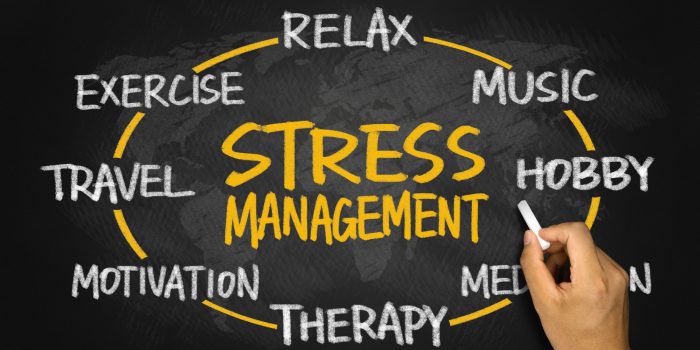
Reversing stress-related premature ageing
February 28th, 2024When exposed to chronic stress, your body ages rapidly, but a study has revealed that it is possible to reverse some stress-related premature ageing. Stress is a risk factor for numerous diseases and disorders. It triggers inflammation and cross-talk between the immune and central nervous system.
Worrying yourself into an early grave
As you age, there is an increasing trajectory of damage accumulation to your body and loss of function, leading to mortality. During the ageing process, the body comes under oxidative stress and inflammation, causing cellular senescence and the shortening of telomeres. Stress causes oxidative stress and inflammation in the body so you literally could worry yourself into an early grave if you don’t manage your stress levels.
The study – Stress can speed ageing but recovery can slow it again
James Patrick White PhD co-senior author of the study and assistant professor of medicine at Duke University in Durham in the US explained that it is one of the first studies to show ageing doesn’t happen in one direction. “People just assumed that as you get older, your biological age goes with it. And that is correct, but there are fluctuations.”
Mr White continued, “You might be stressed out, you might have some trauma, you might have whatever your stressor is that’ll accelerate your ageing. The question was always: Well, are you stuck there? And we’re showing this is not the case. You can reverse back a little bit once that stressor is removed.”
We can control how we respond to stressful situations
Stress is part of life, whether a major crisis or a minor challenge. We can’t always control our circumstances, but we can control how we respond to them. Chronic stress becomes destructive, but if what Mr White is saying is true, then incorporating an effective stress management and recovery plan into your life will help add healthy years and not let stress put you into an early grave.
How can we reduce stressors in our lives?
People deal with stress differently. Men and women deal with stress differently, and there isn’t a for-all strategy to make life less stressful. It’s a matter of finding what works for you, and even if you do, the strategy may need to be adapted as you deal with the other challenges in life. A change, like losing a job or a loved one. A broken relationship or debt. The diagnosis of an illness or being trapped in an abusive relationship. Dealing with a bully, living in an unhealthy environment or being lonely.
To erase the memory of a stressful event would be an ideal start to reduce stressors but that’s not reality. There is no specific treatment for stress but there are treatments for the signs and symptoms – anxiety, depression, mood swings, erratic behaviour or health issues including high blood pressure or heart disease.
Test your stress score here.
If you are struggling to deal with stress, it would be advisable to visit your GP, the GP can do some tests and offer advice. They may offer blood tests to look at hormone and cytokine levels. Also, white blood count panels.
If you’re not ready to visit your GP yet, here is a list of coping strategies and advice to help make your life less stressful and slow down or reverse some premature ageing.
Take time out and read through the list. There might be some life-changing, stress-busting tips that can make your life more calm and less stressful.
- Evaluate your life. Ask yourself questions such as, what am I happy with or unhappy with? What am I capable of, and what do I want from life?
Make time for this important exercise.
- Look at your priorities. Identify a list of priorities and rank them. Divide them into periods, and create priorities for your week and a daily priority list
Avoid listing on electronic devices all the time, seeing lists on paper can give you more clarification – it’s satisfying to tick a completed task.
- Create a stress management plan. Include things from the list below such as identifying triggers, making time to stay connected to people, being active, planning fun experiences etc
Learn to reframe your thinking about stress itself.
- Make changes. If things aren’t working and life is too stressful, there has to be change. The brain automatically receives change as a negative thing but you need to change your mindset and become more flexible
You may make mistakes with your changes but you learn from them.
- Eliminate stressors. For example, if work is causing you a lot of stress, a change of job or career could be what is needed. Or maybe you have health concerns, visit your doctor to help put your mind at rest
Choose to reduce the stressors in your life.
- Limit exposure to triggers. Sometimes we don’t have the choice to not expose ourselves to stressful situations but with good time management and organisation, you can limit exposure to your triggers
Adjust schedules and get control.
- Talk to people. Share your concerns, and ask for advice. Generally, people like to help people, they like to feel needed or be asked for an opinion. Sharing your concerns with a friend or family member could help to relieve stress
You will learn from others.
- Surround yourself with people who make you feel good about yourself and can support you. Having people around you who are in a better mental state than you can help you grow and develop as a person. They can make you feel interested and listened to
You can feed off their positive energy.
- Try to resolve relationship issues that are causing stress. Deal with things face to face, be sure to press the emotional pause button if things get heated. Breathe and reflect before making rash decisions about a relationship
Sometimes it can take a small action to fix a big problem.
- Ask for help with parenting. Build a support network of friends and family to help guide you through parenting challenges. Talk to them and ask for support. Others may be able to offer you coping strategies that they have found successful
Parenting isn’t easy.
- Seek guidance. There are different types of therapists you can go to for advice or guidance. Read the A-Z list of therapeutic approaches from the British Association for Counselling and Psychotherapy(bacp) here
You might not find the right type of therapy for you the first time around. Be open to trying alternatives.
- Try CBT. Cognitive Behavioral Therapy (CBT) is a psycho-social intervention to reduce symptoms of depression or anxiety
The interventions can be done in a group or online.
- Join community groups. Participating in community groups with those with a common purpose allows you to speak to like-minded people
Find people and groups that can add value to your life.
- Ask your GP for advice about sleeping tablets or anti-depressants. Antidepressants increase levels of neurotransmitters in the brain helping with mood and emotion
Asking for help is a sign of strength.
- Ask your GP for a medication review if you have concerns. Medication with side effects can cause anxiety leading to stress
Never adjust dosages without speaking to a medical expert.
- Take professional advice about using cannabis-based products. For example, CBD (Cannabidiol) gives you a feeling of relaxation
It’s important to understand what you are putting in your body and how much you can use safely.
- Positive self-talk and gratitude. Even a single act of gratitude increases happiness and a reduction of depressive symptoms
Focus on breathing and talk yourself out of an anxious episode.
- Keep a diary to monitor your moods and look for patterns and triggers. If you’re not sure why you are so stressed, keep a diary to identify potential triggers
For example, it could be something you are eating or drinking that is affecting your mood.
- Be organised and prepared. Being prepared and organised can help clear your mind and reduce anxiety
When you are productive you get instant gratification.
- Be aware of your environment and pollution or irritants. Overexposure to pollution or irritants can cause a negative biological response resulting in a stress response in the body
Avoid obvious pollution such as traffic fumes or using cleaning products that may irritate your skin.
- Be tidy and clean. Cleanliness is important for good health. Bad hygiene can increase the risk of illness resulting in stress. For example, bad dental hygiene can result in stressful expensive trips to the dentist
A messy house can be stressful so stay on top of things.
- Make the bed and pull the curtains every morning. Being tidy relieves stress. Coming home to a tidy house and a clutter-free sleeping environment improves your mental health
Create a calm atmosphere at bedtime.
- Delegate. Reduce the risk of burnout at work or home, and share the load to reduce overwhelming stress
Don’t try to do everyone’s job thinking you are making your life easier for yourself.
- Make time for yourself and your hobbies. Having a hobby can expand neural connections in the brain releasing feel-good hormones
Sharing a hobby with a partner or friend can be fulfilling and good for the relationship.
- Use controlled deep breathing. It calms the nervous system, lowers blood pressure and reduces stress hormones
Try these breathing exercises.
- Try meditation, yoga, pilates, reiki or tai chi. Doing these activities relieves stress through controlled breathing, emotional release, stimulation, a reset and healing
It’s a great opportunity to meet and mix with new people when you attend classes.
- Acupuncture. This type of therapy stimulates key areas in the body to promote relaxation and balance the body’s qi
What to expect when you have acupuncture.
- Hypnotherapy. In a hypnotic state, a person can experience a release of tension and stress
What happens during hypnosis?
- Aromatherapy. Oils massaged into the skin can impact the hypothalamus by stimulating feel-good chemicals such as serotonin in the brain
List of essential oils.
- Listen to music. Upbeat music can make you feel more optimistic about life and a slower tempo can calm your mind relieving anxiety
Sing along or have a little dance.
- Be creative. Sinking into a creative venture gives you a sense of control and focus helping you to forget worries and anxiety
Try writing, there’s a book in everyone!
- Guided imagery. Dwelling on a positive mental image or scene can relieve stress
Otherwise known as visualisation.
- Progressive muscle relaxation such as stretching. Stretching increases serotonin levels which stabilise our moods and relieve tension
Stretching reduces lactic acid buildup in the muscles which is what causes muscle soreness.
- Massage. It reduces stress by relaxing the muscles and soft tissue in the body
Self-massage tips to relieve pain and tension.
- Hugs and a physical touch. A hug slows the heart rate and decreases stress hormones making you feel safe and more relaxed
Reach out and hug someone today.
- Socialise. In most cases, socialisation increases a hormone that decreases anxiety levels making you feel more confident and less stressed
Mix with people and don’t isolate yourself.
- Avoid confrontation and altercations. In these situations, your body comes under stressful physiological attack, the heart, lungs and other essential organs have to work harder. Things said in a heated argument can cause permanent damage to a relationship.
A raised pulse rate, sweaty palms, an adrenaline rush and restricted breathing aren’t pleasant experiences.
- Walking. Walking is normally a low-impact form of exercise that causes changes in the chemicals in the brain affecting mood and relieving stress
- Exercise. Physical activity bumps up endorphins the feel-good neurotransmitters in the brain helping to relieve stress
It doesn’t have to be energetic exercise.
- Dancing. Rhythmical movement can give you a sense of overall wellbeing and relieve stress
Dance like nobody’s watching!
- Keep hydrated. All of our organs including our brain need water to function properly. When dehydrated the body is strained and becomes stressed
Try to drink at least one litre of water a day.
- Drink herbal drinks. Chamomile and passion flowers contain the flavonoid apigenin which is a natural alternative to antidepressants
The hidden benefits of tea.
- Get plenty of sleep. The body releases cortisol and other stress hormones, well-rested people stay calmer
Limit the use of electronic devices a few hours before you go to bed.
- Have fun. Fun activities can be one of the best stress relievers. It promotes ‘eustress’, good stress which gives you vitality
When was the last time you had fun?
- Laughing. Laughter relieves stress response, soothes tension and improves mood
The Top 100 best comedy movies of all time.
- Take a holiday. It depends on the type of holiday and if it’s with or without kids. Travel is good for your physical and mental health, time to rest and recuperate
29 alternative holiday destinations.
- Limit alcohol and caffeine. Caffeine increases alertness making anxieties worse. Alcohol increases depressive moods
Switch to decaffeinated and try alcohol-free beverages.
- Don’t smoke or do recreational drugs. Both things create a feeling of immediate relaxation but it’s not permanent and creates anxiety
It is also expensive and highly addictive.
- Talk to support helplines. In the UK you can call the Samaritans. In the US you can call Mental Health America
- Eat a nutritional diet. A balanced diet can support a healthy immune system and repair damaged cells
- Take stress relief supplements. We recommend our product NADH (ReConnect®)
ReConnect helps with chronic fatigue syndrome, tiredness and stress. It improves cognitive functions – learning ability, concentration, memory and an ability to think more clearly. ReConnect regulates the sleep/wake cycle and improves mood.
Sometimes you need to go out of your comfort zone and make changes to break a stressful cycle. Being able to deal with change will boost your mood and lower stress levels.
Choose to reduce the stress levels in your life to live longer, and happier.
References






